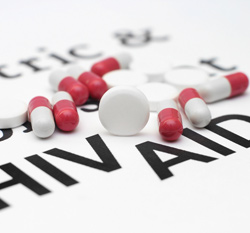Filing for SSDI with HIV/AIDS – Contact Grundy Disability Group
 HIV and AIDS are both serious medical conditions. HIV stands for human immunodeficiency virus, and it compromises the body’s immune system, leaving it vulnerable to infection and illnesses. AIDS is the late stage of the HIV viral infection, when the immune system has become severely compromised and therefore, the individual is at an increased risk for contracting illnesses. Additionally, when a person with HIV and/or AIDS gets sick, they are more susceptible to complications.
HIV and AIDS are both serious medical conditions. HIV stands for human immunodeficiency virus, and it compromises the body’s immune system, leaving it vulnerable to infection and illnesses. AIDS is the late stage of the HIV viral infection, when the immune system has become severely compromised and therefore, the individual is at an increased risk for contracting illnesses. Additionally, when a person with HIV and/or AIDS gets sick, they are more susceptible to complications.
There have been significant improvements in medication regimens for individuals affected by HIV and AIDS. However, due to this, the assessment for disability benefits for HIV patients has also changed. There appears to be an overall improvement in the severity of the disease in people affected by the virus, but co-infections still exist, leading to both minor and serious complications and symptoms. Judges and Social Security staff often pay more attention to a history of improving lab values rather than a history of opportunistic infections and actual functional difficulties.
Many individuals who have HIV, and AIDS, also contract Hepatitis C. This increases the risk for developing further infections, and many people in the medical community view this comorbidity as a third disease. Treatment for Hepatitis C can create side-effects that are disabling, and the disease itself often causes debilitating symptoms. Filing a disability claim for Hepatitis C (HCV) alone, or in combination with HIV/AIDS, requires extensive legal experience, and knowledge of the Social Security Administration’s (SSA) application processes.
We Can Help! Contact Us Today!
When filing for disability benefits with Hepatitis C, a claimant would file under section 5.00 in the Blue Book, which is the section dedicated to digestive system disorders and impairments. Filing a claim for HIV/AIDS is done under section 14.00, which covers immune system disorders.
Applying for Social Security Disability Insurance (SSDI) with Hepatitis C or HIV/AIDS can be done if you suffer from symptoms of the disease(s), or side effects of treatment, that leave you unable to work and earn a living wage. Many Hepatitis C or HIV claims are filed solely on the evidence that a person is suffering from severe fatigue.
Despite debilitating side effects and symptoms of these diseases, many claims are unfortunately denied due to the Social Security Administration not considering cases to be “severe” enough to limit a person’s ability to work. Gathering substantial evidence is essential to applying for SSDI with HIV/AIDS and/or Hepatitis C. This evidence should include a variety of information, including a physician’s assessment of the claimant’s level of function, and any supporting medical records.
Additionally, the question of returning to work is complicated, and involves a consideration of various types of benefits that are made available to claimants– including medical insurance, any subsidized housing, co-payment programs, and the availability of continued Social Security benefits through the Social Security Administration’s work-incentive programs.
People with HIV may not be physically able to take part in Substantial Gainful Activity (SGA), and the key to receiving Social Security Disability (SSD) benefits is proving that living with an HIV infection, and/or Hepatitis C, is debilitating enough to affect your ability to earn a living wage, and other areas of your life.
Reach Out to Grundy Disability Group Today
If you are HIV positive, and trying to apply for SSDI in or near Liberty, Missouri, contact our qualified legal team at Grundy Disability Group today before filing. When it comes to the complicated processes that come with filing a claim under an HIV, AIDS, and/or Hepatitis C infection, we are the lawyers you need to get the best chances at obtaining disability benefits. Contact us today at (816) 415-4560 to request a free case evaluation.


